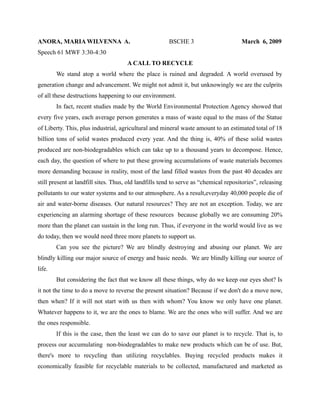
A Call To Recycle
- 1. ANORA, MARIA WILVENNA A. BSCHE 3 March 6, 2009 Speech 61 MWF 3:30-4:30 A CALL TO RECYCLE We stand atop a world where the place is ruined and degraded. A world overused by generation change and advancement. We might not admit it, but unknowingly we are the culprits of all these destructions happening to our environment. In fact, recent studies made by the World Environmental Protection Agency showed that every five years, each average person generates a mass of waste equal to the mass of the Statue of Liberty. This, plus industrial, agricultural and mineral waste amount to an estimated total of 18 billion tons of solid wastes produced every year. And the thing is, 40% of these solid wastes produced are non-biodegradables which can take up to a thousand years to decompose. Hence, each day, the question of where to put these growing accumulations of waste materials becomes more demanding because in reality, most of the land filled wastes from the past 40 decades are still present at landfill sites. Thus, old landfills tend to serve as “chemical repositories”, releasing pollutants to our water systems and to our atmosphere. As a result,everyday 40,000 people die of air and water-borne diseases. Our natural resources? They are not an exception. Today, we are experiencing an alarming shortage of these resources because globally we are consuming 20% more than the planet can sustain in the long run. Thus, if everyone in the world would live as we do today, then we would need three more planets to support us. Can you see the picture? We are blindly destroying and abusing our planet. We are blindly killing our major source of energy and basic needs. We are blindly killing our source of life. But considering the fact that we know all these things, why do we keep our eyes shot? Is it not the time to do a move to reverse the present situation? Because if we don't do a move now, then when? If it will not start with us then with whom? You know we only have one planet. Whatever happens to it, we are the ones to blame. We are the ones who will suffer. And we are the ones responsible. If this is the case, then the least we can do to save our planet is to recycle. That is, to process our accumulating non-biodegradables to make new products which can be of use. But, there's more to recycling than utilizing recyclables. Buying recycled products makes it economically feasible for recyclable materials to be collected, manufactured and marketed as
- 2. new products. You know, simply by recycling, we can reduce the consumption of fresh raw materials, reduce energy usage, reduce air pollution from incineration, reduce water pollution from land filling and reduce greenhouse gas emissions. Because believe it or not, recycling glasses and plastics reduces related air pollution by 20%, and water pollution by 50%. Also, recycling a million tons of paper saves up to 17 million trees, 7 billion gallons of water and 400 million pesos in waste-disposal cost each year. In addition, each metric ton of metal recycled saves up to 12 tons of overburden in the mining sector, 79 tons of water for use and reduces carbon dioxide emissions by 0.5 tons along with many other pollutants. And not only that, recycling also supplies valuable raw materials to the industry, generates income to the economy, creates jobs to thousands of people, reduces the need for new landfills and incinerators and most importantly, it helps sustain our environment for future generations. So you see, saving our planet is possible after all. All we've got to do is to take action. Because we all have a part to play- within our nation, within our community and most especially within ourselves. By taking part, we all can make a difference. So today, I encourage each of you to join me in this advocate. Hand in hand, let us all save our dying planet. Let us all act on this call to recycle.
- 3. e.
